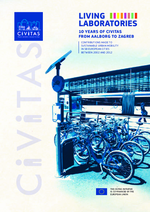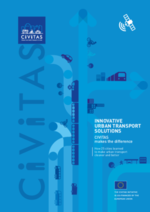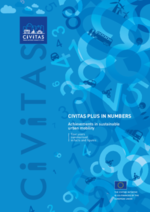ARCHIMEDES
CIVITAS ARCHIMEDES stood for “Achieving Real CHange with Innovative transport MEasures Demonstrating Energy Savings”.

About the project
This motto united the cities of Aalborg (Denmark), Brighton & Hove (UK), San Sebastian (Spain), Iasi (Romania), Monza (Italy), and Usti-nad-Laben (Czech Republic). They were driven by the ambition to increase the share of sustainable modes of transport, improve energy efficiency and provide safer and more convenient travel services in medium-sized urban areas.
CIVITAS ARCHIMEDES consisted of an ambitious blend of policy tools that introduced innovative, integrated and ambitious strategies for clean, energy-efficient, sustainable urban transport.
Each of the six ARCHIMEDES cities was located in a different EU country, including representatives from newer European Member States. Being small and medium-sized, they often lack the resources and leverage bigger cities have at their disposal. Yet, they were keen to demonstrate how they can still achieve the same objectives for clean and energy-efficient transport and sustainable development. They saw innovative solutions as the key to success.
Implementing sustainable mobility
The ARCHIMEDES cities implemented a strong and coherent package of 83 activities to make transport more energy efficient, safer and more convenient. An increased share of clean engine technology and fuels has significantly contributed to achieving this goal. A hallmark of CIVITAS ARCHIMEDES was education. The cities tapped into their existing networks to train and educate students, citizens and practitioners.
Awareness and understanding generated greater acceptance of new tools, services and technologies, which in turn made urban transport more sustainable. At the same time, the ARCHIMEDES partners were keen to learn from each other. They exploited opportunities to exchange knowledge and provide training sessions and technical seminars on different themes tested in the project.
Robust evaluation and the large-scale nature of the project made impacts visible, measurable and promoted the take-up of an integrated package of innovative measures. Targeted research verified the best-practice frameworks, processes and packaging to allow for the successful transfer of tested strategies to other cities.
Project results
The overall aim of CIVITAS ARCHIMEDES was the implementation of an ambitious set of activities to increase energy efficiency of the cities’ transport systems, and provide safer and more convenient transport for all. The project contributed towards better road safety, a greater share of bio-fuels and other alternative fuels, as well as a reduction in CO2 emissions.
ARCHIMEDES helped improve efficiency and effectiveness of urban transport and increase the modal share of sustainable modes. As a result, citizens benefitted from an enhanced urban environment with less noise and air pollution.
The project’s focus on education and the dissemination of results gave ARCHIMEDES an impact well beyond the participating cities. Results were disseminated to promote continuous improvement of sustainable transport policies from the local to the global level. ARCHIMEDES reached out to public authorities to advise on scheme strategy design, implementation and funding.
The partners shared skills and knowledge with education and research communities; and provided products, systems and services to companies. They also passed on policy advice and expertise concerning assessment and management to commercial consultants.
Reaching out to these groups contributed to greater acceptance of new tools, services and technologies. As a consequence, ARCHIMEDES aspired to drive behaviour change, and a take-off of energy saving and cleaner modes in urban transport.
Cities
Fast Facts
September 2008 - September 2012
Project duration
82 measures
Measures implemented
Latest
Knowledge Bank
Mobility solutions
Thematic areas
Collective passenger transport & shared mobility
Clean & energy-efficient vehicles
Behavioural change & mobility management
- Mobility marketing and awareness raising
- Mobility Planning
Road safety & security
- Enhancing passenger security
- Safer roads, bike and foot paths
- Cybersecurity and data privacy




















